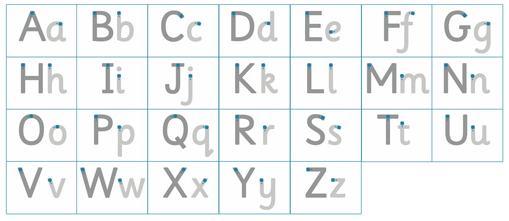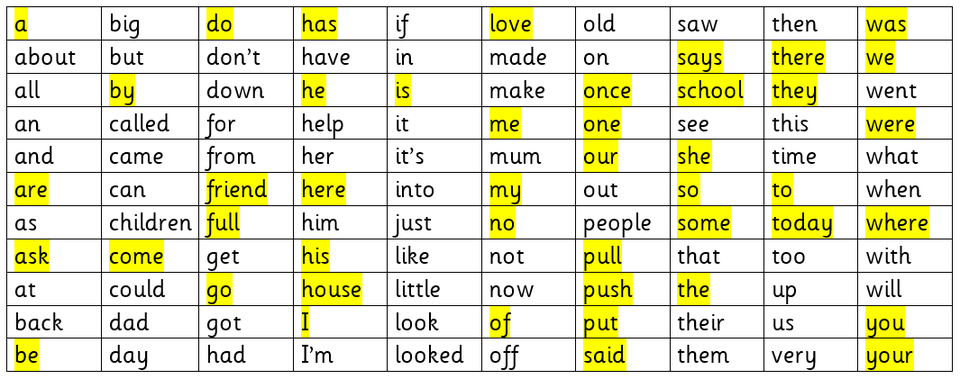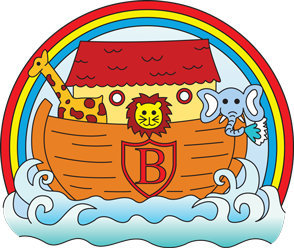Early Years
Early Years Foundation Stage (Ages 2-5)
Within the foundation stage we place great emphasis on finding out about what interests our children and building on these interests in the learning environment. The curriculum is planned around the national 'Guidance for the Foundation Stage,' and emphasises three main characteristics of learning:
- Playing and exploring
- Active learning
- Creating and thinking critically
It also emphasises seven key areas of learning:
Prime areas of learning:
- Communication and Language
- Personal, Social and Emotional Development
- Physical Development
Specific areas of learning:
- Literacy
- Maths
- Understanding the world
- Expressive arts and design
Letter formations
Correct formation of letters is taught, progressing to joined up writing when appropriate. To help your children to practice these, you could:
- ask them to write the letter shapes in wet sand
- paint the letter shapes using finger painting or cotton buds in paint
- write the letter shape in highlighter pen and ask them to trace over the top of it
- write the letter shape and ask them to copy it underneath

Here are 15 ideas to get children writing at home:
- Put them in charge of writing a shopping list and being the one to tick off items whilst in the shop
- Write a postcard
- Keep a diary of happy memories
- Write some song lyrics (perhaps to a well-known tune)
- Magic spells
- Write your own recipe
- Wish list of things that they would like to do when they are older
- Film/TV review
- Design a menu
- Describe your favourite superhero or design your own one
- Take some photos of a place that you visit together and use it as a story scene setting
- Make a mind map
- Listen to a piece of music and write how it makes you feel
- Write a set of instructions on how to build a model
- Make up your own script for a weather forecast or news report
Spelling
- Phonics
- encourage your child to listen carefully to sounds in words
- encourage them to write the sounds that they hear in order to help them make phonetically plausible attempts to spell words.
- Learning high frequency and key words – some words have to be learned from memory such as 'the'.
- encourage children to learn the spellings of these words from memory and practice writing them.
Here is a list of the high frequency and key words that we use at Balliol:

Reading
At Balliol, we start by teaching letter sounds rather than letter names. We therefore have a phonic-based reading approach and encourage children to sound out unfamiliar words whilst using the pictures and book context to help them.
Once children are able to hear the sounds in words and blend sounds together, they are introduced to simple one sound, one spelling CVC words (consonant, vowel, consonant) such as 'mum', 'dog', 'jam' and 'sit'.
Next, we introduce the concept that the sounds '<f>', '<l>', '<s>' and '<z>' can be spelt with the two letter-spellings '<ff>', '<ll>', '<ss>' and '<zz>', such as in 'bell'. We call this 'two letters, one sound.'
As the children grow in confidence with this, we move onto VCC, CVCC, CCVC, CCVCC and CCCVC words, such as, for example, 'elf', 'hand', 'swim', 'trust' and 'scrub'.
After this, their understanding of the concept 'two letters, one sound' is further developed through the introduction of '<sh>', '<ch>' and '<th>', in words like 'shop', 'chimp' and 'thin'.
Finally, two, three and four letter spellings of the vowels are introduced and pupils are taught how to read and spell polysyllabic words, starting with simpler words (such as 'bedbug') and gradually moving to the more complex (such as 'mathematical').
Reception children will bring home a book to share each evening. Here are a few ideas to help them with their reading:
- Encourage them to sound out unfamiliar words or use the pictures to help them
- Ask them questions about what they have read
- Get them to predict the ending of the story
Please write in their reading diary to share with us how they are getting on at home.
-
Oxford Owl Free e-books for ages 3-11
-
Magnetic letters Which letters can your child recognise? Can they spell out different words? Can they spell their name?
Maths
A lot of maths opportunities come from real life experiences such as:
- Cooking - measuring vocabulary when weighing ingredients, capacity of containers, time of cooking, fractions when dividing up food such as cake!
- Going shopping - addition and subtraction when using money, coin recognition, estimating how much all of your item will cost
- Painting a picture - size of paper, ratio of different colours when colour mixing
- Making a necklace - repeating patterns, length vocabulary
- Watching TV or making a phone call - number recognition when changing the channel/dialing the number
To find out more about how we teach maths at Balliol, please see our calculation policy.
Number Formation
Here is how we form our numbers at Balliol:

Click here to go back to the main curriculum page:
Click here to visit the foundation stage class pages:
